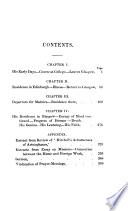 | Charles Wesley - 1832 - 164 pages
...ifEisF, C is D; if GisH, C is D ; but C is not D ; therefore A is not B, E is not F, G is not H. 3rdly, If A is B, C is D ; if E is F, G is H ; if I is K, L is M ; but C is not D, G is not H, L is not M ; therefore A is not B, E is not F, I... | |
 | William Arnot - 1842 - 120 pages
...both premises compound. ' In its general form it may be thus expressed : — < If A is B, C is D ; and if E is F, G is H : ' But either A is B, or E is F : ' .'. either C is D, or G is H. («) ' This general form may be modified (although the essence of the things is unchanged), by the... | |
 | William Arnot - 1842 - 432 pages
...In its general form it may be thus expressed : — ' If A is B, C is D ; and if E is F, G is II : ' But either A is B, or E is F : ' .-. either C is D, or G is H. («) ' This general form may be modified (although the essence of the things is unchanged), by the... | |
 | Henry Aldrich - 1852 - 308 pages
...D ; But either A is B, or E is F ; . - . C is D. II. Complex Constructive. If A is B, C is D ; and if E is F, G is H ; But either A is B, or E is F ; . • . Either C is D, or G is H. rumque duo (etsi interdum plura) proponit adversario capienda ; quorum utrumvis acceperit, causa cadet.... | |
 | Charles Kittredge True - 1860 - 188 pages
...more conditional propositions, and the minor a disjunctive proposition ; as, If A is B, 0 is D, and if E is F, G is H; But either A is B or E is F ; Therefore, 0 is D or G is H. If ^Eschines joined in the public rejoicings he is incon sistent ; if... | |
 | Francis Bowen - 1864 - 472 pages
...had different Consequents, the Conclusion would be Disjunctive. Thus : — If A is B, C is D ; and if E is F, G is H ; But either A is B or E is F ; .-. Either C is D, or G is H. In this case, the Modus fallens is also valid ; if we disjunctively deny the Consequents, we may, in... | |
 | Francis Bowen - 1864 - 480 pages
...had different Consequents, the Conclusion would be Disjunctive. Thus : — If A is B, C is D ; and if E is F, G is H ; But either A is B or E is F ; .-. Either C is D, or G is H. In this case, the Modw tallens is also valid ; if we disjunctively deny the Consequents, we may, in... | |
 | Francis Bowen - 1864 - 480 pages
...they had different Consequents, the Conclusion would be Disjunctive. Thus: — If A is B, C is D ; and if E is F, G is H; But either A is B or E is F ; .-. Either C is D, or G is H. In this case, the Modus tollens is also valid; if we disjunctively deny the Consequents, we may, in... | |
 | Thomas Fowler - 1867 - 218 pages
...there are two valid forms, one constructive and the other destructive. (3) If A is B, C is D ; and if E is F, G is H ; But either A is B, or E is F ; ... Either C is D, or G is H. (4) If A is B, C is D ; and if E is F, G is H ; But either C is not D, or G is not H ; . • . Either... | |
 | Thomas Fowler - 1869 - 222 pages
...there are two valid forms, one constructive and the other destructive. (3) If A is B, C is D ; and if E is F, G is H ; But either A is B, or EisF; .-.Either C is D, or G is H. (4) If A is B, C is D; and if EisF, G is H; But either C is not... | |
| |